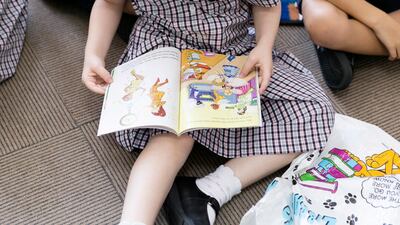In a few days' time, the annual Month of Reading will draw to a close. It was launched with a fanfare at the beginning of March, with Sheikh Mohammed bin Rashid, Vice President and Ruler of Dubai, announcing that 303,000 local students would be taking part in the broader Arab Reading Challenge this year. That's nearly double the number of 2018, thanks to sterling work by the Ministry of Education. In excess of 1,000 events were said to have been planned by more than 60 federal and local government bodies, as well as the private sector.
According to our Minister of Culture and Knowledge Development, Noura Al Ka’abi, the Month of Reading is an event “in which our educational and cultural institutions, governmental and private, launch their initiatives, projects and programmes that stimulate the community to read and make reading a daily habit in our lives across the country".
Supported by the National Reading Law and by the National Strategy for Reading 2016-2026, the month, one would like to think, has made a significant impact. The only event related to reading and, more broadly, to literature that has attracted much in the way of media attention, though, has been the highly successful Emirates Airline Festival of Literature.
The Year of Reading, of which the month is a spin-off, was marked in 2016 in recognition of the importance of promoting a culture of reading, not just among young people, in and out of school, but more widely. That remains true today.
For myself, the month has seen the usual sort of mix, some rather heavy factual stuff interspersed with the relaxation gained from diving into a couple of light, escapist bits of fiction. In all cases, the reading has been of physical books, rather than online or via Kindle. I much prefer poring over print to peering at a screen.
At Al Bateen Academy, the Abu Dhabi secondary school of which I am a governor, the students have been encouraged by teachers and, I hope, by some peer pressure, to take part in a school-wide reading campaign. I trust that some have actually done so, at a time when tests and assessments due at the end of the second term have required extra attention to be focused on normal coursework and revision.
Book Character Day – in which children are encouraged to attend classes dressed up as a favourite literary figure – may have helped, along with the school’s fourth annual Literature Week, which included a variety of activities designed to engage and enthuse students.
Perhaps, however, the initiative that will prove to be of most long-lasting value will have been the publication, for the third time, of a special book written by students themselves. Appearing every second year, this project encourages students to write their own pieces for publication, in either Arabic or English. This year's production, titled Writers Taking Flight, includes a variety of short stories and poems, produced by students across the school's year groups. Some are of remarkable quality.
For many of the young authors, it will have been the first time that their work has appeared in print, with a book to take home and to share with friends. For some, I would hope, it won’t be the last time. Who knows what future journalists, novelists, poets and playwrights are amongst them?
Projects such as these, however, rarely emerge out of nowhere. Underlying them is dedicated work not just by students but also teachers, who have encouraged their pupils to put pen to paper, or fingers to keyboard, and then worked with them to edit their output.
Other schools may, of course, do something similar. There are certainly some that produce yearbooks and magazines that provide their students with an opportunity to put their work before a reading public.
Such initiatives ensure that a focus on the importance of reading, and of being able to express thoughts in writing, is not confined to one month a year. The production of a printed volume, however slim, requires much more than that.
Looking back at the Month of Reading, it’s important to remember that it provides an opportunity for additional focus on something that is always important, in terms of life-long learning as well as within formal education.
The same is true of the other special years that have now become a standard part of UAE life. The philosophies of the 2017 Year of Giving and the 2018 Year of Zayed remain relevant, while, as the recent horrific terrorist attack in Christchurch, New Zealand demonstrates, the meaning and aims of this Year of Tolerance are of perennial importance. The messages and the lessons to be learned from them are of universal value.
Peter Hellyer is a consultant specialising in the UAE’s history and culture


